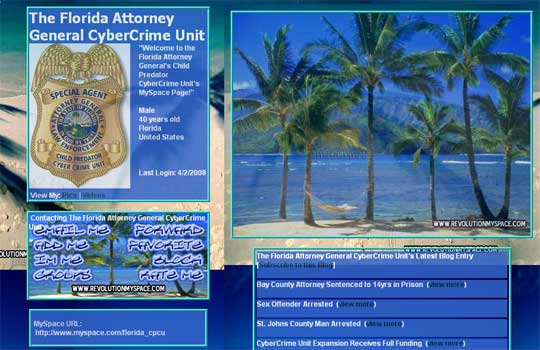Northview Students Learn Cybersafety From AG’s Office
April 8, 2008
Kathy Pacheco from the Florida Attorney General’s Cybercrime Office painted a chilling picture for students at Northview High School Monday morning. A young girl meets someone she believes to be a young man online. They chat; she begins to trust him. She has personal problems that he seems to understand. He has the right answer for all her problems.
They being to chat online five, six hours per day. She hurries home to chat with him; he gets angry if she’s not online. She wants to make him happy. He admits that he was a little dishonest about his age. Maybe he’s in his twenties, not a teen. She does not care; she likes him. After a little more time goes by, he admits his real age…56. But she’s OK with that, because she really loves him; after all, he understands all her problems at home. In fact, she mentions that maybe she just might run away from home.
LMIRL.
Those five letters appear on her screen. Attorney General Bill McCollum has called those the five most dangerous letters in the alphabet. LMIRL — Let’s Meet In Real Life.
The girl in our story runs away with the 56 year old man. They are finally caught in Reno. He goes to jail for 25 years. She get a letter from him, threatening to kill her when he gets out. That’s not the part of the letter she notices. She’s more concerned that he did not tell her how much he cares for her in the letter.
It’s real life, a real story, Pacheco tells the Northview students. A sexual predators on the Internet is like a lion stalking his prey, she said, adding that you never really know who you are talking to on the other end of an online chat.
Pacheco showed them a drawing of of a man that was extremely ugly, to the point of being comical. “Would you chat with him?” The juniors and seniors laugh.
“What about her,” she asks, showing a picture of an attractive young lady that several guys described as “hot”. Many admit that they would.
“But what if this she was really a he?” Pacheco asked, drawing lots of comments from the students.
“That would suck,” one student says.
 That was the case, she told them, of Paul Parker in Bay County. Parker, 42, enticed young boys over the internet by pretending to be a teenage girl or boy and persuaded them to perform sexual acts via webcam. Parker would then record these acts and make pornographic videos from them. He also placed additional child pornography videos on the internet, where they were discovered by an undercover CyberCrime investigator who was able to trace them back to Parker.
That was the case, she told them, of Paul Parker in Bay County. Parker, 42, enticed young boys over the internet by pretending to be a teenage girl or boy and persuaded them to perform sexual acts via webcam. Parker would then record these acts and make pornographic videos from them. He also placed additional child pornography videos on the internet, where they were discovered by an undercover CyberCrime investigator who was able to trace them back to Parker.
He would threaten to send the videos to the victim’s friends if the did not further comply with his requests. He bribed a young boy to meet him at a hotel. He’s now serving 14 years in prison.
“That’s it? God that’s awful,” a student says.
Pacheco then showed the students a MySpace page belonging to a user named “Danny”. Danny’s page looks fairly normal, other than he has just a handful of MySpace friends. A few students admit that they might chat with Danny, or add him if he made a friend request on MySpace.
Danny actually created the page while a serving time in an Arizona prison.
Pacheco also told students that dangers exist everywhere there is person to person contact on the Internet, not just on MySpace. Places like Facebook and gaming websites can also lure predators because there are minors online there.
Students played a game of “Pick the Perp” where they were shown four pictures at a time. Some where convicted sexual offenders, others were Cybercrime Unit officers. They were generally unsuccessful in picking the sexual predator over the officer, allowing Pacheco to make the point that it’s not possible to tell who is good and who is bad by the way they look.
One of the “Pick the Perp” pictures was of a seemingly innocent looking hardware salesman. He thought he had arranged an in person meeting with a teen, but he had actually arranged to meet an investigator. He was arrested when he showed up at the arranged meeting site. He had duct tape, rope and a machete in his possession at the time of his arrest.
The Northview students also learned that when something is posted online, it may never go away…even if the student deletes it.
“Do you really want the rest of the world to know your business?” Pacheco asked the students.
She said collegess will often do an Internet search before admitting a student, and employers will often do the same before hiring someone. Those are cases, she said, where something posted now can come back to haunt students in the future.
She encouraged the students to send a friend request to the Cybercrime Unit’s MySpace (pictured above) at http://www.myspace.com/florida_cpcu. When added, it will place a Cybercrime badge in the student’s MySpace. That will potential frighten away predators, she said.
- For more information about cyber safety, visit http://www.safeflorida.net/safesurf or http://www.myspace.com/florida_cpcu
- Those who receive unwanted photos, messages or solicitations on the Internet are advised to call: (800) The-Lost or visit www.cybertipline.com
To read our installment in this Cyber Safety series from Monday, click here. To read our blog on the subject, click here.





Comments